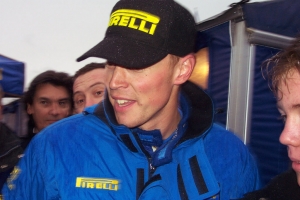Remembering one of rallying's brightest stars.
Richard Burns won the World Rally Championsip ten years ago today, and died of a brain tumour on the very same date in 2005. The history books will say that between the years of 1990 and 2003, he entered 104 rallies, scored 10 wins, 34 podiums, 277 stage wins and one World Championship. However, the figures really don't tell the story of this most cerebral of rally drivers.
Burns was not a driver in the mould of, say, Colin McRae or Tommi Makkinen, instantly engendering hero-worship via a spectacular driving style. In many ways, he was the forerunner to Sebastien Loeb, with a style that was neat, consistent and deceptively fast. Burnsie had world-class car control as you would expect, but on top of that, he could think his way to victory. His pace notes were extremely detailed for the time, and he would control his pace to ensure he finished rallies rather than push like crazy and risk an accident.
 This calculating style and an unshakeable self-belief coupled with a reserved manner outside of the car could make him appear arrogant, and for some that made him a hard driver to love. I was a huge fan of the WRC in the late 90s, and Richard Burns was barely a blip on my radar compared to the none-more-sideways, win-or-bust antics of McRae. Yet during that period, Burns won rallies against the very best drivers of the time, and in a four-way title showdown at the Rally GB in 2001, he triumphed when both McRae and Makkinen crashed out on the first day. Again, his ability to know exactly how hard to push without overstepping the limit meant he finished the rally where others did not, and as the famous racing adage says, to finish first, first you must finish.
This calculating style and an unshakeable self-belief coupled with a reserved manner outside of the car could make him appear arrogant, and for some that made him a hard driver to love. I was a huge fan of the WRC in the late 90s, and Richard Burns was barely a blip on my radar compared to the none-more-sideways, win-or-bust antics of McRae. Yet during that period, Burns won rallies against the very best drivers of the time, and in a four-way title showdown at the Rally GB in 2001, he triumphed when both McRae and Makkinen crashed out on the first day. Again, his ability to know exactly how hard to push without overstepping the limit meant he finished the rally where others did not, and as the famous racing adage says, to finish first, first you must finish.
Fast-forward a couple of years and Burns was back in contention for 2003 the championship, after a typically consistent season. He led the championship for much of the year despite not winning a single rally, and was arguably driving more strongly than in his Championship-winning year. Then came the Rally GB.
I was on my way down to Wales to watch from the stages when the news came over the radio; Richard Burns had collapsed at the wheel of his Porsche 911 on the way down to Wales, and had been forced to withdraw from the rally. Terrible shame, I thought, perhaps it's exhaustion or something similar. It wasn't. It was the first symptom of a particularly nasty form of brain tumour, and sadly he would never drive a rally car in competition again.
At the time, I wasn't particularly sad at not seeing Burnsie in action. I was there to watch McRae and Solberg, and while the news of his retirement was unfortunate, I though nothing of it as soon as the first WRC car came tearing through the Welsh forests in a shower of mud and gravel.
I deeply regret that now. Though I was never a fan of his during his rallying career, it turns out that Richard Burns was exactly the kind of driver that I admire the most. Supremely talented and gifted with an intelligence that allowed him to apply that talent with ruthless self-control, he was one of rallying's unsung heroes and the sport missed him greatly in the years to follow.
He disappeared from public life altogether and as with his rallying career, it's only afterwards that we truly appreciate his achievements as he fought the illness. Burns was diagnosed with a grade 4 astrocytoma, the worst and most malignant kind. The median survival time is given in weeks. He fought for two years, finally succumbing to his illness on the four-year anniversary of his World Championship.
Six years on, the world knows that Richard Alexander Burns was one of rallying's greatest, a genius at the wheel and a man to admire. I'd like to remember him in his own words to long-time co-driver Robert Reid as they crossed the finish line as World Champions in 2001:
“You're the best in the world!”
Richard, you really were. RIP.
Photo credits
Headshot by destinyuk on Flickr.

